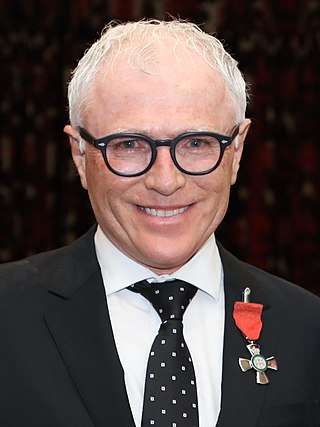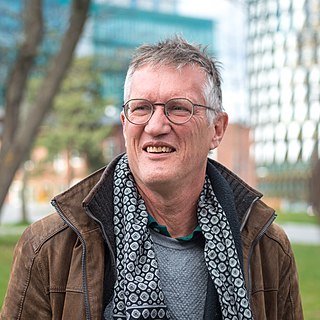Pox parties, also known as flu parties, are social activities in which children are deliberately exposed to infectious diseases such as chickenpox. Such parties originated to "get it over with" before vaccines were available for a particular illness or because childhood infection might be less severe than infection during adulthood, according to proponents. For example, measles is more dangerous to adults than to children over five years old. Deliberately exposing people to diseases has since been discouraged by public health officials in favor of vaccination, which has caused a decline in the practice of pox parties, although flu parties saw a resurgence in the early 2010s.

Sunetra Gupta is an Indian-born British infectious disease epidemiologist and a professor of theoretical epidemiology at the Department of Zoology, University of Oxford. She has performed research on the transmission dynamics of various infectious diseases, including malaria, influenza and COVID-19, and has received the Scientific Medal of the Zoological Society of London and the Rosalind Franklin Award of the Royal Society. She is a member of the scientific advisory board of Collateral Global, an organisation which examines the global impact of COVID-19 restrictions.
Alison P. Galvani is an American epidemiologist. She is the Burnett and Stender Families Professor of Epidemiology at the Yale School of Public Health and the Director of the Center for Infectious Disease Modeling and Analysis.

Michael George Baker is an epidemiologist with the University of Otago. Baker is a member of the New Zealand Food Safety Authority's Academy and of the New Zealand Ministry of Health's Pandemic Influenza Technical Advisory Group (PITAG).

The COVID-19 pandemic, also known as the coronavirus pandemic, is a global pandemic of coronavirus disease 2019 (COVID-19) caused by severe acute respiratory syndrome coronavirus 2 (SARS-CoV-2). The novel virus was first identified in an outbreak in the Chinese city of Wuhan in December 2019. Attempts to contain it there failed, allowing the virus to spread to other areas of Asia and later worldwide in 2020. The World Health Organization (WHO) declared the outbreak a public health emergency of international concern (PHEIC) on 30 January 2020. The WHO ended its PHEIC declaration on 5 May 2023. As of 13 October 2023, the pandemic had caused 771,190,439 cases and 6,961,001 confirmed deaths, ranking it fifth in the deadliest epidemics and pandemics in history.

Syra Madad is an American pathogen preparedness expert and infectious disease epidemiologist. Madad is the Senior Director of the System-wide Special Pathogens Program at NYC Health + Hospitals where she is part of the executive leadership team which oversees New York City's response to the Coronavirus disease 2019 pandemic in the city's 11 public hospitals. She was featured in the Netflix documentary series Pandemic: How to Prevent an Outbreak and the Discovery Channel documentary The Vaccine: Conquering COVID.

Michael Joseph Ryan is an Irish epidemiologist and former trauma surgeon, specialising in infectious disease and public health. He is executive director of the World Health Organization's Health Emergencies Programme, leading the team responsible for the international containment and treatment of COVID-19. Ryan has held leadership positions and has worked on various outbreak response teams in the field to eradicate the spread of diseases including bacillary dysentery, cholera, Crimean–Congo hemorrhagic fever, Ebola, Marburg virus disease, measles, meningitis, relapsing fever, Rift Valley fever, SARS, and Shigellosis.

Bonnie J. Fraser Henry is a Canadian physician and public servant who has been the provincial health officer at the British Columbia Ministry of Health since 2014. Henry is also a clinical associate professor at the University of British Columbia. She is a specialist in public health and preventive medicine, and is a family doctor. In her role as provincial health officer, Henry notably led the response to COVID-19 in British Columbia (BC).

Nils Anders Tegnell is a Swedish civil servant and physician specialising in infectious disease. From 2013 until his resignation in March 2022 he was Sweden's state epidemiologist.
Lauren Marie Gardner is an American engineer who is an associate professor and co-director of the Center for Systems Science and Engineering at Johns Hopkins University. She created the Johns Hopkins University dashboard that is used to share information about the COVID-19 pandemic.

Caitlin M. Rivers is an American epidemiologist who as Senior Scholar at the Johns Hopkins Center for Health Security and assistant professor at the Johns Hopkins Bloomberg School of Public Health, specializing on improving epidemic preparedness. Rivers is currently working on the American response to the COVID-19 pandemic with a focus on the incorporation of infectious disease modeling and forecasting into public health decision making.

Kizzmekia "Kizzy" Shanta Corbett is an American viral immunologist. She is an Assistant Professor of Immunology and Infectious Diseases at Harvard T.H. Chan School of Public Health and the Shutzer Assistant Professor at the Harvard Radcliffe Institute since June 2021.
Allison Joan McGeer is a Canadian infectious disease specialist in the Sinai Health System, and a professor in the Department of Laboratory Medicine and Pathobiology at the University of Toronto. She also appointed at the Dalla Lana School of Public Health and a Senior Clinician Scientist at the Lunenfeld-Tanenbaum Research Institute, and is a partner of the National Collaborating Centre for Infectious Diseases. McGeer has led investigations into the severe acute respiratory syndrome outbreak in Toronto and worked alongside Donald Low. During the COVID-19 pandemic, McGeer has studied how SARS-CoV-2 survives in the air and has served on several provincial committees advising aspects of the Government of Ontario's pandemic response.
Helen Branswell is a Canadian infectious diseases and global health reporter at Stat News. Branswell spent fifteen years as a medical reporter at The Canadian Press, where she led coverage of the Ebola, Zika, SARS and swine flu pandemics. She joined Stat News at its founding 2015, leading the website's coverage of the ongoing COVID-19 pandemic.
Natalie E. Dean is an American biostatistician specializing in infectious disease epidemiology. Dean is currently an assistant professor of Biostatistics at the University of Florida. Her research involves epidemiological modeling of outbreaks, including Ebola, Zika and COVID-19.

Saskia Popescu is an infectious disease epidemiologist and Senior Infection Preventionist in Phoenix, Arizona. She holds academic appointments at the University of Arizona and George Mason University’s Schar School of Policy and Government, where she lectures on biopreparedness and pandemic and outbreak response. Since the start of the Coronavirus disease 2019 pandemic, Popescu has worked to prepare for and mitigate the spread of the disease. She has been recognized for her communication efforts around the pandemic, as well as her work on the front lines.

Martin Kulldorff is a Swedish biostatistician. He has been a professor of medicine at Harvard Medical School since 2003, though on leave as of 2023. He is a member of the US Food and Drug Administration's Drug Safety and Risk Management Advisory Committee and a former member of the Vaccine Safety Subgroup of the Advisory Committee on Immunization Practices at the US Centers for Disease Control and Prevention.
Michael Joseph Mina is an American epidemiologist, immunologist and physician. He was formerly an assistant professor of Epidemiology & Immunology and Infectious Diseases at Harvard T.H. Chan School of Public Health, assistant Professor of Pathology at Brigham and Women's Hospital, Harvard Medical School, and currently Chief Medical Officer at eMed.
Helen Siobhan Marshall is an Australian medical researcher who is Professor of Vaccinology at the University of Adelaide. She was named the South Australian of the Year for 2022.

John Gerrard is currently the Chief Health Officer of Queensland, beginning the role in December 2021. Gerrard has a record in research of emerging infectious diseases and vaccine development, investigating AIDS in Australia and dealing with the Ebola outbreak in West Africa in 2014. Gerrard has additionally become notable during the COVID-19 Pandemic, previously working as a director of infectious diseases at the Gold Coast University Hospital and being the first doctor in Queensland to treat a COVID-19 patient.











